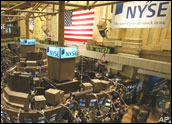
I was a technology reporter for CNBC during the boom years of 1997-2000, when the only inflation that was going on was the air being pumped into the tech bubble by day traders.
I lost count of the times when I would start my workday at the old network headquarters in Fort Lee, N.J., only to watch the Nasdaq jump by 100 points within the first half-hour of trading. By that point, my bosses were already screaming at me to head across the Hudson River to spend the rest of my day following tech stocks at the former Nasdaq Marketsite at Pearl and Whitehall Streets in lower Manhattan, in the shadows of the late, lamented Twin Towers.
One particularly busy day for me in January 1999 stands out as a very good example of how technology and greed were being used to rig the game. Broadcast.com, the digital media company that helped make Mark Cuban a billionaire when he sold it to Yahoo, saw its stock rise so fast that Nasdaq officials called a halt to trading and demanded an explanation. Company officials in Dallas told me there was nothing to report; no mergers/acquisitions/sales or other major news pending, and a recent conference presentation by executives didn’t add much to the picture. Trading resumed and a couple of months later, Cuban made his deal and went on to become the richest heckler of NBA referees to ever haunt a sports arena.
At the time my colleagues and I chalked it up to the barely controlled insanity over this Internet thing, the same phenomenon that made one-hit wonders out of companies like Xoom and Pets.com. Any company with a “.com” in its title was a portfolio must-have. It was later when we heard another possible explanation; rumors floated in Internet Relay Chat (IRC) rooms and message boards by day traders looking to make a quick grand or two by manipulating the price of BCST stock.
There aren’t as many day traders in 2008, but the financial chat rooms and message boards remain. They’ve been joined by social networks, including one now partnering with my former New Jersey employers. The markets, however, are heading rapidly in the opposite direction and we have more than enough breaking news about a broken economy in a ratings-driven electronic media right now. The last thing we need are jackals using the Internet to bring more pain to Wall Street and Main Street.
Web Lessons Learned From the Bubble
A cursory glance at the financial information marketplaces on the Internet show that everybody seems to be behaving themselves — more or less. Remember, it was the wealth of data suddenly at the beck and call of tech-savvy investors that helped democratize the trading process back in the mid-1990s. Just as Bill Clinton used Arsenio Hall to bypass traditional media gatekeepers in the 1992 presidential campaign, so too did electronic markets allow ordinary investors to leap-frog some of the same Wall Street brokerage giants that now find themselves scrambling for purchase after the mortgage landslide.
But if the Internet became a wellspring of instant knowledge for investors in the late ’90s, now it’s the Mississippi River at flood stage. Couple that with the addition of the Fox Business Network to CNBC and Bloomberg (a moment of silence, please, for CNNfn), along with Web 2.0 tools for providing real-time feedback and commentary, and investors now find themselves even more heavily armed and, literally, ready for business.
I’d like to think the eyes scouring the Web for financial information are a little bit wiser thanks to last decade’s tech boom and bust, the resulting scandals and lack of trust in securities analysts and corporate executives. At least let’s hope they are quicker studies than the so-called market movers and shakers. The recent economic shockwaves show that those in the banking industry and in the corner offices at the brokerage firms didn’t seem to get the memo from the 1990s; you know, the one warning about greed and arrogance — those who forget history are condemned to granting jumbo mortgage loans to those who can’t afford them, and so on.
New Tools to Chart a Sinking Market
That may be why I’m not too concerned that some of the financial chat room scammers and cyber pump-and-dumpers are still around. Web sites with active message boards like Silicon Investor and Yahoo Finance have pumped up their own terms of service agreements with enough cover-their-butt verbiage to please the most neurotic of corporate counsels, but news consumers are still urged to use common sense when they see a board topic screaming DOUBLE YOUR MONEY! JUST VISIT!!
Two new developments involving social networks offer a little hope for a better-educated investing public. Just as the bad economic news began to hit critical mass in the mainstream media, the Wall Street Journal Online launched a beta version of a Community tool. It’s behind a paywall, which may explain both the higher quality of its member commentary and the low number of members in its groups; the most popular group, Information Technology, has 245 members — a little light, in my opinion, for one of the top names in financial journalism, but give it time. The WSJ Community also steals a page from Facebook (pun intended) by allowing users to create profiles.
LinkedIn, the social network for professionals, recently signed a content partnership with CNBC.com, which should pay better, more targeted demographic dividends than its deal with The New York Times. Since it’s a relatively new partnership, the content is still thin on CNBC’s Web site, but when LinkedIn surveys its 26 million members on timely topics — like its latest one on “whether the government should bail out troubled companies (most don’t think so)” — the results are also aired on CNBC. Also, I’m guessing that many of LinkedIn’s members belong in the Rolodexes of the top business network’s guest bookers, if they aren’t there already.
I left CNBC in mid-2000, turning down an offer of a new contract. My three years there taught me that I loved covering technology, but I hated covering tech stocks. I wanted to focus on the magic, not the money. Eight years later, it’s banks, homes and retirement accounts that are in danger of pulling a disappearing act.



















































